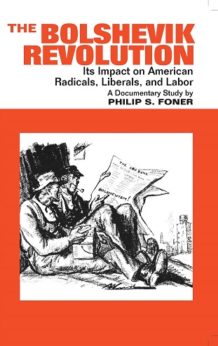
New People’s World series—The Centennial of the Russian Revolution
November 7, 2017 marks the 100th anniversary of the Russian Revolution and the establishment of the world’s first socialist state. To commemorate the occasion, People’s World is launching a new series of articles that present wide-angled assessments of the revolution’s legacy, the Soviet Union and world communist movement which were born out of it, and the revolution’s relevance to radical politics today. Proposals for contributions are welcome and should be emailed to cjatkins@peoplesworld.org. Other articles in the series can be read here.
This November (or October by the old-style Russian calendar) marks the 100th Anniversary of the Bolshevik Revolution, perhaps “one of the great events of human history,” as the indomitable John Reed would put it in 1917.
It was fifty years (1967) after the birth of the world’s first socialist republic that Philip S. Foner—who happened to be one of the greatest historians of the 20th century—in collaboration with International Publishers, first released The Bolshevik Revolution: Its Impact on American Radicals, Liberals, and Labor, a first-of-its-kind history documenting the broad array of support the Revolution had among the U.S. working class.
And now, during the centennial of the Bolshevik Revolution, International Publishers has released a new edition of Foner’s groundbreaking study, a centennial edition with a new introduction by prolific historian Gerald Horne.
For both the general reader as well as those more familiar with U.S. working class history, Foner’s collection of newspaper articles, speeches, resolutions—documents that constitute a history of support for the revolution—is nothing short of impressive.
That Foner also provides a fifty-page introduction, placing the revolution and the various responses to it in historical-political context, is also worthy of note, as most general readers today (as well as in 1967) will likely not be familiar with the lengths to which the U.S. government—and the then-reactionary American Federation of Labor—went to suppress the new republic internationally, while simultaneously stifling voices of support for it domestically, both within labor and the general population.
In fact, the support received by the revolution domestically among average people, mostly workers, may well have been forgotten without Foner’s documentary collection, as the prevailing winds of the “Red Scare” and the Cold War served to put most historians—perhaps those with less foresight, backbone and courage—on notice, especially if they desired tenure at the university level. Foner had been removed from his teaching position in 1941, due to anti-communism; it would be a quarter century before he would again receive a full-time teaching position. This time it was at Lincoln University, ironically, also in 1967.
In The Bolshevik Revolution, you will learn that the American Labor Alliance for Trade Relations with Russia, founded in fall 1920 and representing 800,000 New York union members, resolved that “the State Department take immediate steps to remove all obstacles to trade with Russia…,” a sentiment at odds with U.S foreign policy, which then had as its goal to strangle the infant socialist republic in its crib.
Additionally, the Labor Alliance and its objectives were “endorsed by 12 international and national unions, more than a score of state federations of labor, and the central labor unions of 72 cities in 29 states…,” all affiliated with the AFL and “representing a membership of 2,500,000 workers,” more than half of the Federation’s membership at the time. We even learn that Samuel Gompers’ (the AFL’s reactionary president) union, the Cigar Makers, endorsed normalizing relations with the Soviets, Gompers’ disdain for socialism notwithstanding.
Interestingly, the Labor Alliance’s secretary was none other than Alexander Trachtenberg, who would establish International Publishers just four years later, in 1924.
In The Bolshevik Revolution we learn of the clergy’s early support for the revolution, as Dr. John Haynes Holmes, pastor the New York City Church of the Messiah, for example, would proclaim, “Thank God for the Russian Revolution.” We also hear directly from “a Wall Street millionaire, a banker, a captain of industry, a ‘mining king,’ Col. William Boyce Thompson,” who spent six months in Soviet Russia and told newspapers upon his return: “I sincerely believe that Russia is pointing the way to general peace, just as she is pointing the way to great sweeping world changes…,” not least of which was the then-ascending tide of workers’ revolts, strikes, the growth in unionism generally, and socialist revolutions to come.
We also learn of legendary socialist Eugene V. Debs’ early support for the revolution. He would write, “The world stands amazed, astounded, awe-inspired…” by the Bolsheviks, adding, “…whatever may be the fate of the revolution, its flaming soul is immortal.” It is a sentiment still shared by many one hundred years after its birth.
Debs would also declare: “I am a Bolshevik and proud of it.”
Just as important as the documentary history comprising Foner’s book is Gerald Horne’s introduction to the centennial edition, an introduction that places the revolution—though ultimately defeated—in world historical context.
Horne shows the linkage to and inspiration from another great revolution, that of Haiti. He sheds light on the role of Soviet communists as well as Haitian revolutionaries; the latter marked “a general crisis of the entire slave system…,” while the former marked “a general crisis of the entire system of capitalism,” and both “shook the world,” to paraphrase John Reed.
Further, Horne highlights the “widespread support” from African Americans—most notably W.E.B. DuBois and Paul Robeson—for the revolution, and notes that, given the history of first slavery and then wage exploitation, it shouldn’t come as a surprise that the Bolsheviks received so much support in the United States, especially among Black workers.

Foner’s The Bolshevik Revolution is a must read for anyone remotely interested in what average workers actually thought, and wrote, during the first three years of the Revolution. International Publishers and Gerald Horne have done a great service by bringing out this new, centennial edition.
The Bolshevik Revolution: Its Impact on American Radicals, Liberals, and Labor
By Philip S. Foner
International Publishers, 2017, 304 pages











